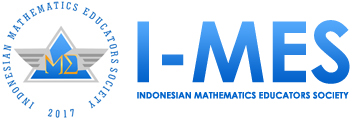ANALYSIS OF THE GAP IN THE USE OF MICROSOFT TEAMS AS AN ONLINE LEARNING TOOL TOWARDS STUDENTS' MOTIVATION IN MATHEMATICS
Abstract
Full Text:
PDFReferences
Anditiasari, N., Pujiastuti, E., & Susilo, B. E. (2021). Systematic literature review : pengaruh motivasi terhadap kemampuan berpikir kreatif matematis siswa. Aksioma: Jurnal Matematika Dan Pendidikan Matematika, 12(2), 236–248.
Andriani, D., & Sojanah, J. (2017). Upaya Meningkatkan Kompetensi Siswa Melalui Motivasi Belajar. Jurnal Pendidikan Manajemen Perkantoran, 2(1), 242. https://doi.org/10.17509/jpm.v2i1.14604
Blossfeld, H.-P., & von Maurice, J. (2019). Education as a Lifelong Process. https://doi.org/10.1007/978-3-658-23162-0_2
Cabansag, P., Cabansag, V., & Soriano, R. (2020). Students’ Motivation toward Online Learning: Basis for Policy Making. The ASTR Research Journal, 4(1), 81-103. https://www.ejournals.ph/article.php?id=16463
Caena, F., & Redecker, C. (2019). Aligning teacher competence frameworks to 21st century challenges: The case for the European Digital Competence Framework for Educators (Digcompedu). European Journal of Education, 54(3), 356–369. https://doi.org/10.1111/ejed.12345
Dimyati dan Mudjiono. 2013. Belajar Dan Pembelajaran. Jakarta: Rineka Cipta
Fitrian, R., & Dewi, R. (2021). Ragam Tingkat Kemampuan Berpikir Kreatif Siswa dalam Pembelajaran Matematika Daring. In Menjadi Guru Profesional dan Inovatif dalam Menghadapi Pandemi (Antologi Esai Mahasiswa Pendidikan Matematika).
Gillham, B. (2008). Developing a questionnaire. A&C Black
Hendricks, C. B. (1961). The Process of Education (Bruner, Jerome). Journal of Chemical Education. https://doi.org/10.1021/ed038pa276.2
Herlambang, Y. T. (2018). Pedagogik: Telaah Kritis Ilmu Pendidikan dalam Multiperspektif. Jakarta: Bumi Aksara.
Ilag, B. N. (2018). Introduction: Microsoft Teams. In Introducing Microsoft Teams. https://doi.org/10.1007/978-1-4842-3567-6_1
Laili, A. N., Akmalia, D. A., Silmi, E. N., Ummah, S. N., Nayyiroh, Z., & Fauzi, I. (2022). Analisis Problematika Pendidik dalam Pembelajaran Daring pada Mata Pelajaran Matematika di Sekolah Menengah Pertama. Cetta: Jurnal Ilmu Pendidikan, 5(3), 317–328. https://doi.org/10.37329/cetta.v5i3.1737
Lase, D. (2019). Pendidikan di Era Revolusi Industri 4.0. SUNDERMANN: Jurnal Ilmiah Teologi, Pendidikan, Sains, Humaniora dan Kebudayaan, 1(1), 28-43. https://www.jurnal.sttsundermann.ac.id/index.php/sundermann/article/view/18
Lase, D., Daeli, D. O., Ndraha, A., & Harefa, J. (2021). Skills and Competencies of Christian Religious Education Teachers in the Industrial Revolution 4.0 Era. SSRN Electronic Journal, 1, 4–9. https://doi.org/10.2139/ssrn.3904632
Lazarides, R., Harackiewicz, J., Canning, E., Pesu, L., & Viljaranta, J. (2015). The role of parents in students’ motivational beliefs and values. In The Routledge International Handbook of Social Psychology of the Classroom. https://doi.org/10.4324/9781315716923
Liu, S., Li, Z., Zhang, Y., & Cheng, X. (2019). Introduction of Key Problems in Long-Distance Learning and Training. October 2018, 1–4.
Meşe, E., & Sevilen, Ç. (2021). Factors influencing EFL students’ motivation in online learning: A qualitative case study. Journal of Educational Technology & Online Learning, 4(1), 11–22. http://dergipark.org.tr/jetolDoi:http://doi.org/10.31681/jetol.817680
Mevlevi, M. T., Prihartini, P., & Kuswanto, K. (2021). Pengaruh Kepala Sekolah dalam Pengelolaan Pendidikan di Sekolah Dasar. SAP (Susunan Artikel Pendidikan), 5(3). https://doi.org/10.30998/sap.v5i3.8425
Moawad, R. A. (2020). Online Learning during the COVID- 19 Pandemic and Academic Stress in University Students. Revista Romaneasca Pentru Educatie Multidimensionala. https://doi.org/10.18662/rrem/12.1sup2/252
Mourtzis, D., Vlachou, E., Dimitrakopoulos, G., & Zogopoulos, V. (2018). Cyber- Physical Systems and Education 4.0 -The Teaching Factory 4.0 Concept. Procedia Manufacturing, 23(2017), 129–134. https://doi.org/10.1016/j.promfg.2018.04.005
Mustami, M. K., & Safitri, D. (2018). The effects of numbered heads together-Assurance Relevance Interest Assessment Satisfaction on students’ motivation. International Journal of Instruction, 11(3), 123–134. https://doi.org/10.12973/iji.2018.1139a
Nurfallah, M., & Pradipta, T. R. (2021). Motivasi Belajar Matematika Siswa Sekolah Menengah Selama Pembelajaran Daring di Masa Pandemi COVID-19. Jurnal Cendekia : Jurnal Pendidikan Matematika, 5(3), 2425–2437. https://doi.org/10.31004/cendekia.v5i3.752
Nurkholis. (2013). PENDIDIKAN DALAM UPAYA MEMAJUKAN TEKNOLOGI Oleh: Nurkholis Doktor Ilmu Pendidikan, Alumnus Universitas Negeri Jakarta Dosen Luar Biasa Jurusan Tarbiyah STAIN Purwokerto. 1(1), 24–44.
Octaberlina, L. R., & Muslimin, A. I. (2020). Efl students perspective towards online learning barriers and alternatives using moodle/google classroom during covid-19 pandemic. International Journal of Higher Education, 9(6), 1–9. https://doi.org/10.5430/ijhe.v9n6p1
Peraturan Menteri Pendidikan dan Kebudayaan Republik Indonesia Nomor 109 Tahun 2013 Tentang Penyelenggaraan Pendidikan Jarak Jauh Pada Pendidikan Tinggi
Prawanti, L. T., & Sumarni, W. (2020). Kendala Pembelajaran Daring Selama Pandemic Covid-19. Prosiding Seminar Nasional Pascasarjana UNNES, 286–291.
Rahmawati, F. F., Setiawan, D., & Roysa, M. (2021). Penyebab Kesulitan Belajar Siswa pada Pembelajaran Daring. Journal for Lesson and Learning Studies, 4(3), 302–308. https://doi.org/10.23887/jlls.v4i3.32506
Sabri, A. (2020). Pendidikan Islam Menyongsong Era Industri 4.0. Deepublish
Schunk, D.H., Pintrich, P.R., & Meece, J.L. (2008). Motivasi Dalam Pendidikan. Edisi 3. Terjemahan Ellys Tjo. 2012. Jakarta: PT Indeks
Steinmayr, R., Weidinger, A. F., Schwinger, M., & Spinath, B. (2019). The importance of students’ motivation for their academic achievement-replicating and extending previous findings. Frontiers in Psychology, 10(JULY). https://doi.org/10.3389/fpsyg.2019.01730
Sugiono. (2017). Metode Penelitian Pendidikan Pendekatan Kuantitatif, Kualitatif, dan R&D. Bandung: Alfabeta. Metode Penelitian.
Tim Office 365. (2020). Menggunakan Microsoft Teams untuk Kelas Online (Remote Learning) https://365.telkomuniversity.ac.id/menggunakan-microsoft-teams-untuk-kelasonline-remote-learning
Weber, K. (2003). The relationship of interest to internal and external motivation. Communication Research Reports. https://doi.org/10.1080/08824090309388837
DOI: https://doi.org/10.37058/jarme.v6i1.9437
Refbacks
- There are currently no refbacks.

This work is licensed under a Creative Commons Attribution-ShareAlike 4.0 International License.
Jurnal Penelitian Otentik Pendidikan Matematika (JARME)
Program Studi Pendidikan Matematika Universitas Siliwangi
Jl. Siliwangi no. 24 Kota Tasikmalaya - 46115
email: jarme@unsil.ac.id
e-ISSN: 2655-7762
Dilisensikan di bawah Lisensi Creative Commons Attribution 4.0 International
StatCounter: Detail
Diindeks oleh :


.jpg)
.jpg)



